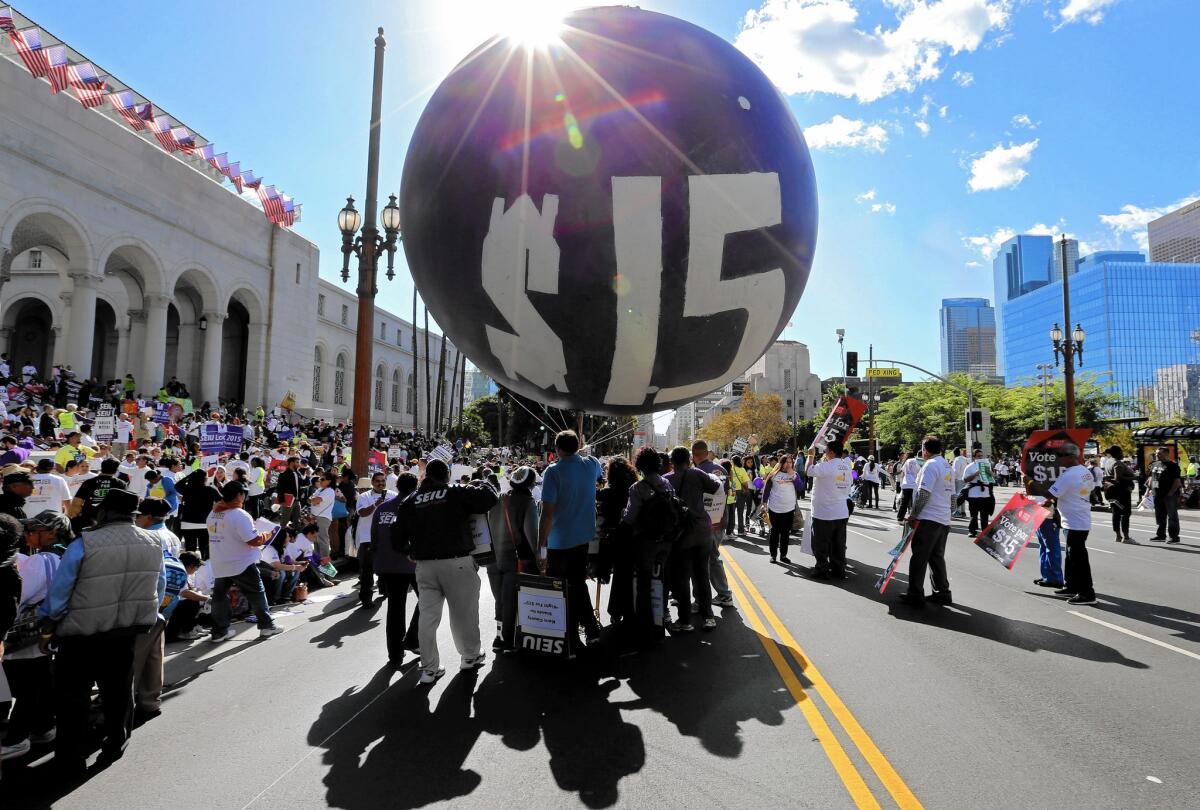A new year and new laws – on guns, voting and minimum wage

Protesters call for a higher minimum wage in Los Angeles in November. The wage will rise in California, New York and several other states on Friday.
Laws taking effect at the start of the new year show states diverging on some hot-button issues.
Restrictions on carrying guns will ease in Texas, for example, but will get tighter in California. It will be easier to register to vote in Oregon, but there will be another step to take at the polls in North Carolina.
The opposing directions in the states reflect a nation with increasingly polarized politics.
Here are some of the more notable laws taking effect in January:
Guns
Texas, the second-most populous state, is joining 44 other states in allowing at least some firearm owners to carry handguns openly in public places. Under the Texas law, guns can be carried by those with licenses and only in holsters.
Meanwhile, California, the most populous state, has multiple new laws on gun control. One tightens a ban on firearms in and around schools. Under the new law, the prohibition will apply even to most people who are allowed to carry concealed weapons generally. Another will allow people to request that a judge order weapons be taken from relatives who are believed to pose a threat.
Voting
California and Oregon will become the first states that automatically register eligible voters when they obtain or renew their driver’s licenses. Similar measures have been proposed in other states but never adopted.
In North Carolina, a voter identification law passed in 2013 that requires people to show a photo ID is taking effect. An amendment, however, allows voters who have trouble obtaining the required ID to vote anyway. That provision keeps North Carolina from joining eight states in which a photo ID is strictly required.
In most states, voters are asked to show some kind of identification.
Public health
California is joining West Virginia and Mississippi as the only states without a personal-belief exemption for parents who do not want to vaccinate their children. Children whose parents refuse to have them immunized against several diseases will not be allowed to enroll in public or private school and would instead have to be home-schooled. There is an exemption for children with serious health problems.
Hawaii is becoming the first state to raise its minimum age, from 18 to 21, to buy or use cigarettes or e-cigarettes.
Employment issues
In California, a new law lets female employees allege pay discrimination based on the wages a company pays other employees who do substantially similar work. Under the law, it will be up to employers to prove a man’s higher pay is based on factors other than gender.
Oregon will become the fifth state with a paid sick leave mandate for many employers.
Some cities in traffic-congested urban areas are trying to ease the burdens of commuting. Employers with at least 20 workers in Washington, D.C., and New York City will be required to offer commuter benefits such as tax-free mass transit subsidies to their workers. San Francisco already has a similar ordinance.
In Missouri, a new law will link the duration of jobless benefits to the state’s unemployment rate. When fewer people are out of work, those claiming the benefits will be cut off sooner.
Minimum wage
The minimum wage will rise in many cities and states with the new year. Some of the wage increases are coming under laws passed years ago that phased in the increases over a period of years. Some are automatic increases tied to the cost of living.
Fast-food workers in New York state will receive their first pay bump under a new law that eventually will push their minimum wage to $15. The full amount will kick in at the end of 2018 in New York City and 2021 in the rest of the state.
The federal government has not touched the minimum wage since it was increased to $7.25 effective in 2009.
The wages also are rising in California, Connecticut, Hawaii, Maryland, Massachusetts, Michigan, Rhode Island, Vermont and West Virginia on Friday. States with automatic annual increases effective in the new year are Arizona, Colorado, Montana, New Jersey, Ohio and South Dakota.
Taxes
Taxes are going up in some places and dropping in others.
Income tax rates will drop slightly in Oklahoma, where state revenue has fallen sharply, and Massachusetts.
In North Carolina, the tax on gasoline will drop by a penny a gallon to 35 cents. The sales tax on boats will drop in New Jersey as of Feb. 1.
Taxes on cigarettes and other tobacco products will rise in Minnesota, as will hotel taxes in Hawaii.
Abortion
Physicians in North Carolina will be required to provide the state with ultrasound images of fetuses and other data related to abortions performed after the 16th week of pregnancy.
For pregnancies terminated after the 20th week, doctors must explain to the state Department of Health and Human Services how continuing the pregnancy would have threatened the life and health of the mother.
Immigrant driver’s licenses
Two more states are allowing people who are in the United States illegally to be licensed to drive. Delaware’s law took effect Sunday and Hawaii’s will be in effect in the new year.
Ten states — including California — and the District of Columbia already have similar provisions.
Pets
Illinois is making it a misdemeanor to leave pets outside during extreme weather.
Missouri, in a crackdown on the state’s commercial “puppy mills,” is requiring dog breeders to provide more space for their animals and is barring them from using wire-strand flooring in dog kennels.
ALSO
Higher pay, hoverboards and vaccinations: Hundreds of new laws in California
Sex-crime charge marks a turning point in the Bill Cosby saga
Texas ‘affluenza’ teen is fighting deportation from Mexico; mother arrives in L.A.
More to Read
Sign up for Essential California
The most important California stories and recommendations in your inbox every morning.
You may occasionally receive promotional content from the Los Angeles Times.










